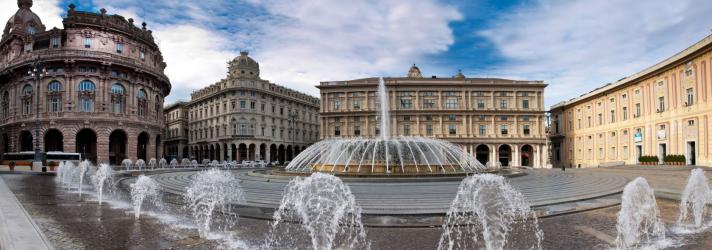Blending heritage with innovation
Genoa's deep-rooted history is seamlessly intertwined with forward-thinking innovation, reflecting the city’s commitment to preserving its cultural heritage while embracing modernity. A prime example is the UNESCO-listed Palazzi dei Rolli, a collection of noble residences that are now open to the public through events such as the Rolli Days, allowing both locals and tourists to experience the grandeur of these historic buildings.
The destination’s creative spirit extends beyond its historic sites. The Genova Jeans initiative, for example, celebrates Genoa’s role in the creation of denim, a fabric that has become a global cultural icon. The Via del Jeans cultural itinerary showcases the city’s historic ties to the textile industry, while the Genova Jeans Week highlights the ongoing evolution of this cultural heritage. In addition, the city's medieval heritage is being rediscovered through immersive events, including theatre performances and guided tours of ancient churches, abbeys, and towers, offering a vivid glimpse into Genoa’s past.
Creating smart and inclusive tourism experiences
Genoa’s approach to tourism is deeply rooted in inclusivity. The Genova City Pass, which offers discounted and customisable access to the city’s main attractions, allows visitors to experience Genoa’s rich heritage at an affordable price. Smart tourism is also bolstered by digital initiatives, such as virtual and augmented reality on the VisitGenoa app, which brings the city’s historical and cultural landmarks to life. Genoa’s digitalisation efforts further extend to the Loquis travel podcast platform, which allows visitors to discover unique stories linked to the places they explore.
A contemporary city with a long-lasting commitment to sustainability
Integrating cultural heritage preservation with urban regeneration is a cornerstone of Genoa’s strategy, as exemplified by the transformation of the Renzo Piano-designed Levante Waterfront. The city’s eco-museums, such as the open-air museum at the Palazzi della Certosa, address key contemporary issues such as climate change and overtourism, while involving local communities in the creative process.
The city’s commitment to sustainability is reinforced by the Green Plan, which focuses on urban greenery and eco-friendly mobility. Projects such as the Pedestribus aim to reduce carbon emissions and promote more sustainable urban mobility. In the historic district of Caruggi, these efforts are complemented by major urban regeneration projects, improving the quality of life for residents and enhancing the visitor experience.
Making cultural heritage accessible to all
Accessibility is at the heart of Genoa’s tourism and cultural strategy. The city’s Plan for the Elimination of Architectural Barriers, launched in 2023, has mapped out areas of the city, indicating accessibility levels to ensure that all visitors, regardless of their physical abilities, can enjoy Genoa’s rich cultural offerings. Digital tools, such as 3D digitisation of UNESCO-listed palaces, further enhance this accessibility, allowing virtual exploration of the city’s treasures.
Genoa's comprehensive efforts also extend to its urban regeneration projects as well. Initiatives such as the Cities After Dark projects aim to create fully accessible and safe urban spaces around the clock. Meanwhile, the Genova Street Lab project, focuses on community involvement in urban planning, ensuring that the needs of all citizens are taken into account when designing public spaces.



